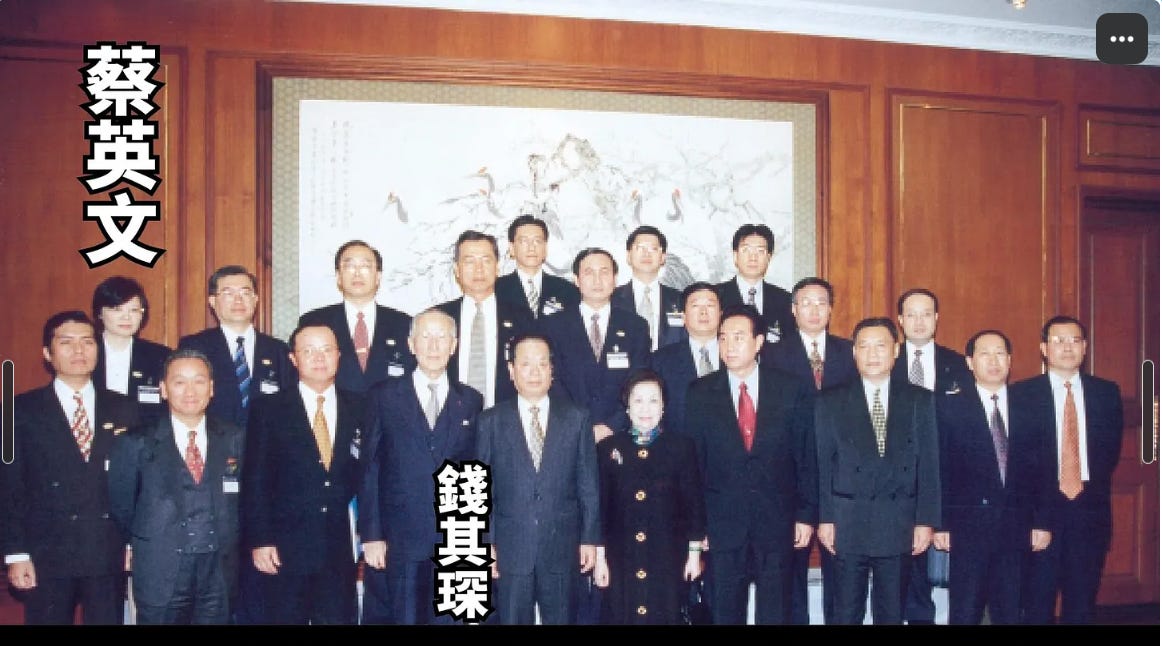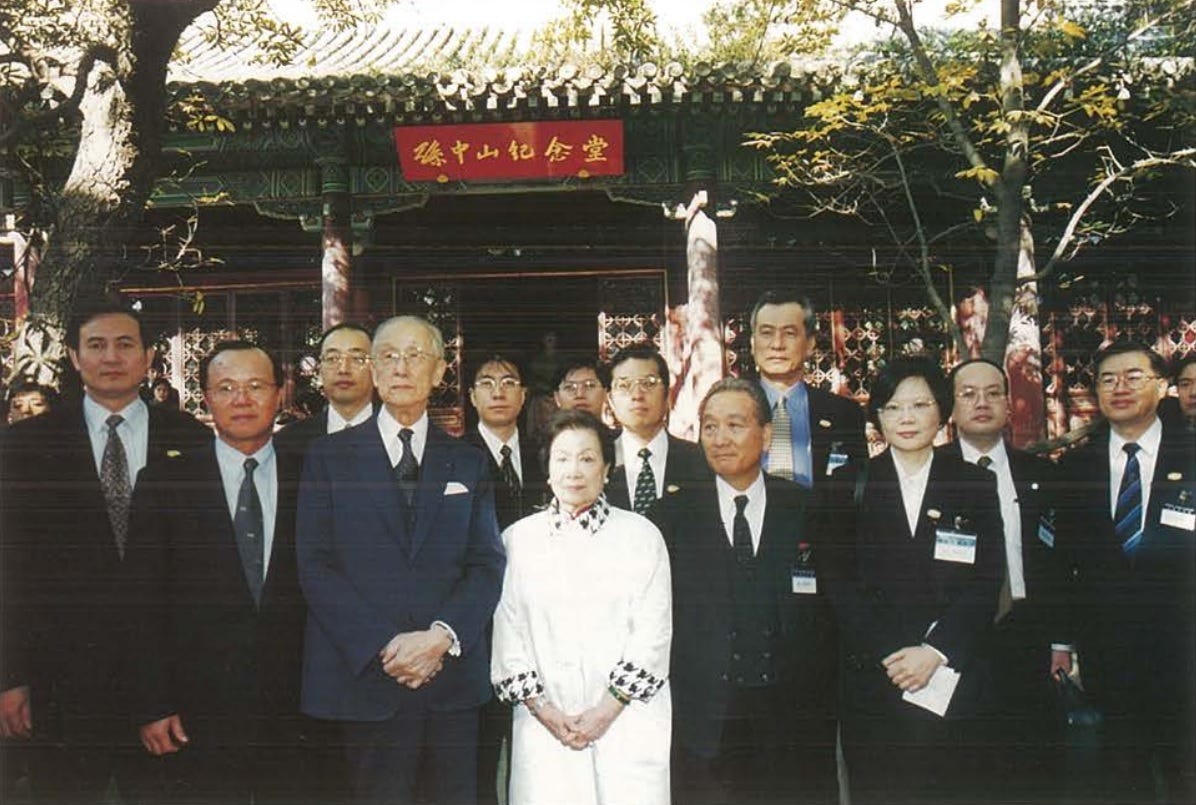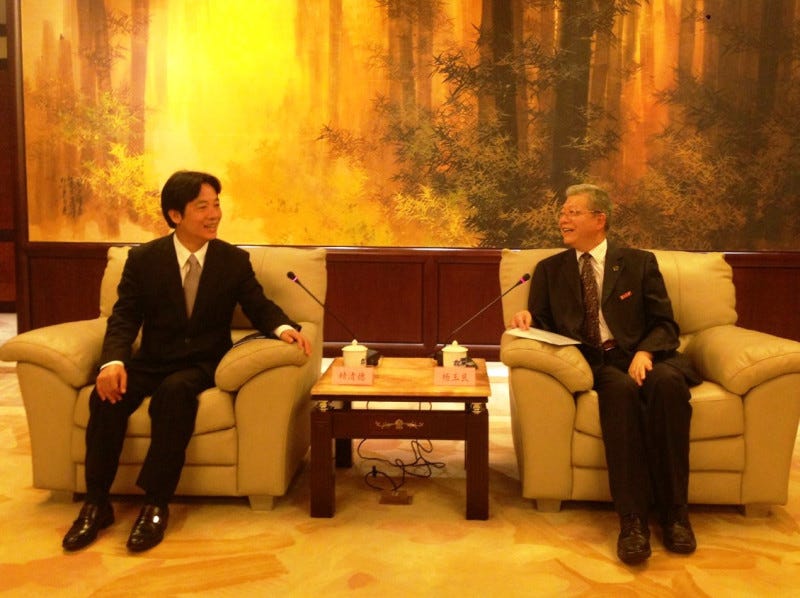Taiwan's former parliamentary speaker proposes "separate jurisdictions, one sovereignty"
Wang Jin-pyng says not to abandon "the opportunity for people on both sides to jointly pursue the well-being of the Chinese nation," and respect the separate jurisdictions across the Strait.
If world peace really hinges on, as many claim, what happens across the Taiwan Strait, you’ll have to bear with me for more posts on the seemingly niche subject.
Wang Jin-pyng, a member of the Kuomingtang (KMT) party, is the longest-serving Taiwanese top legislator, holding the position from 1999 to 2016.
On November 13, Wang launched a cross-party thinktank “Moral Peace Union.”
Soon after, Wang visited the Chinese mainland and paid respects to his ancestors, and participated in cross-Strait exchanges. During the trip, he met Song Tao, the Chinese mainland's senior Taiwan affairs official, in the mainland city of Xiamen on November 18.
On November 27, at a regular press conference of the mainland’s Taiwan Affairs Office, a spokesperson responded to a question about Wang Jin-pyng and his “Moral Peace Alliance.” According to the record published by the mainland’s Taiwan Affairs Office:
Reporter from China Media Group:
Wang Jin-pyng, former head of Taiwan’s legislative body, who recently established the cross-party think tank “Moral Peace Alliance” in Taiwan, expressed his commitment to promoting cross-strait peace. Subsequently, he visited Zhangzhou, Fujian Province, to pay respects to his ancestors and expressed hope for joint peace across the strait, emphasizing the need to enhance national and cultural identity among compatriots. What’s your comments and responses?
Chen Binhua, spokesperson for the Taiwan Affairs Office:
Maintaining peace and stability across the Taiwan Strait is the common aspiration of compatriots on both sides. The foundation and prerequisite for achieving this shared desire are adhering to the “1992 Consensus” and opposing “Taiwan independence.” As long as there is recognition that both sides of the strait belong to one China, there are no obstacles to dialogue and communication with any political parties, groups, or individuals in Taiwan.
Mr. Wang Jin-pyng’s ancestral visit reflects the Chinese nation’s fine tradition of honoring ancestors and demonstrates a commitment to inheriting and promoting excellent traditional Chinese culture. It also shows the strong desire of many Taiwanese compatriots to strengthen cross-strait exchanges. Compatriots on both sides of the strait are Chinese, connected by blood as one family. Promoting excellent traditional Chinese culture is a common obligation of compatriots on both sides; safeguarding the common homeland of the Chinese nation is a shared responsibility; and achieving the great rejuvenation of the Chinese nation is a common mission. We hope that the vast number of Taiwanese compatriots will uphold national righteousness, conform to the trend of history, and work together with mainland compatriots to promote the peaceful development and integration of cross-strait relations, advance national reunification, and jointly create a bright future for the great rejuvenation of the Chinese nation.
Today (Sunday, December 8), in the first forum of the thinktank, Wang initiates a new vision for cross-strait relations:
两岸治权互不隶属,主权同而不分, which I translate as “the two sides’ jurisdictions do not subordinate to each other, and sovereignty is one without division.”
Below is my English translation of Wang’s speech today, proposing his new vision based on a video recording.
World peace is our common goal. To achieve this lofty ideal, I believe we must start with ourselves, and the first step is to realize peace across the Taiwan Strait. The Taiwan Strait region is considered by international affairs experts as one of the most unstable areas for global security. Many also believe the Taiwan Strait issue is intricate and difficult to resolve. However, I think that no matter how complex the problem is, as long as we eliminate ideological interference, return to rationality, and trace back to the fundamental historical facts, we can find a reasonable and feasible solution.
In 1996, Mr. Lee Teng-hui stated in his inaugural address that “For over 40 years, the two sides of the Straits have been two separate jurisdictions due to various historical factors, but it is also true that both sides pursue eventual national unification. Only when both sides face up to the facts and engage in dialogue with profound sincerity and patience will they be able to find the solution to the unification question and work for the common welfare of the Chinese people.” I believe that Mr. Lee’s formal speech is even more worthy of our reference now.
Over the past 70 years, Taiwan has experienced different stages of development, with varying thoughts and approaches to cross-strait policies at each stage. However, we can affirm that during Taiwan’s peaceful revolution towards democratization, we simultaneously adopted more open and pragmatic approaches to cross-strait policies, establishing a policy direction of resolving confrontation through exchanges and enhancing mutual trust through communication.
During his presidency, Mr. Lee Teng-hui established the National Unification Council, promulgated the Guidelines for National Unification, facilitated the Koo-Wang Talks, and initiated a new era of positive cross-strait interaction. Mr. Lien Chan and Mr. Ma Ying-jeou, using the 1992 Consensus as the greatest common denominator between the two sides, deepened cross-strait exchanges, strengthened mutual trust, and laid a good foundation for the stable development of cross-strait relations. Ms. Tsai Ing-wen, who participated in the Koo-Wang Talks in Shanghai and Beijing, and Mr. Lai Ching-te, who led a delegation to visit Shanghai during his tenure as mayor, have personally experienced and acknowledged the positive benefits brought by cross-strait exchanges.
Unfortunately, in recent years, cross-strait relations, which once saw the dawn of peace, have encountered many variables, even becoming a dangerous area where international affairs experts predict potential military conflicts. The reasons include rapid changes in the international environment, ideological constraints, and, more importantly, misunderstandings arising from the stagnation of cross-strait exchanges, leading to subsequent confrontations. Many believe that the stalemate between the two sides is an unsolvable problem. However, I have always believed that no knot cannot be untied; it depends on whether we have the wisdom and patience to handle it. As long as we first establish our goals and seek consensus, starting by understanding each other’s positions, we can open a new path for cross-strait relations. The common goal of both sides is to ensure the safety and well-being of the people, and the greatest consensus is to respect each other’s systems and way of life.
Under this premise, we need to pragmatically accept history and the current situation. The separate governance of the two sides is a historical issue, but after operating for more than 70 years, each has developed its own unique way of life, which we must face as a reality. The people on both sides of the Strait jointly inherit Chinese culture, sharing the same traditions in language, customs, religion, and beliefs; this is also a historical fact we must uphold. Therefore, I advocate that 两岸治权互不隶属,主权同而不分 the two sides’ jurisdictions do not subordinate to each other, and sovereignty is one without division. I repeat, my position is that the two sides’ jurisdictions do not subordinate to each other, and sovereignty is one without division.
We respect the fact of separate jurisdictions across the Strait but do not abandon the opportunity for people on both sides to jointly pursue the well-being of the Chinese nation. We accept the current state of affairs but do not deny the sentiments of history. Separate jurisdictions without separation is the most pragmatic approach at this stage to resolve confrontation, break the deadlock, and create opportunities for peace.
Over the years, with the efforts of visionary leaders from all sectors, cross-strait relations have progressed towards seeking common ground while reserving differences, creating a stable environment for Taiwan, allowing us to focus on economic development, pursue social progress, and improve people’s lives.
Today, we have no reason not to continue expanding the space for peaceful development for our next generation on the foundation built by our predecessors, ensuring a prosperous future for them.
Peace is a universal value pursued by all. Like all the representatives present, I am willing to contribute to sustainable peace. Today, in your presence, I have presented my views on creating a new situation in cross-strait relations, hoping that aspiring individuals will work together, hand in hand, towards a new era of cross-strait peace and global harmony.
The original Chinese speech by Wang Jin-Pyng on Sunday, December 8, 2024
世界和平是我们共同追求的目标,但要达成这个远大的理想,我认为必须从我们自身来做起,而第一步就是实现两岸的和平。台海地区被国际事务专家视为是全球安全最不稳定的一个地区,也有许多人认为台海问题盘根错节难以解决。但金平认为,就算是再错综复杂的问题,只要能排除意识形态的干扰,回归理性、追根溯源,回到最根本的历史事实,都可以找到合理可行的解决之道。
1996年,李登辉先生在就职典礼致辞中提出, 四十多年来,海峡两岸因为历史因素,而隔海分治,乃是事实;但是海峡双方都以追求国家统一为目标,也是事实。两岸唯有面对这些事实,以最大的诚意与耐心,进行对谈沟通,化异求同,才能真正解决国家统一的问题,谋求中华民族的共同福祉。金平认为登辉先生的这段正式讲话在此时此刻更值得我们借鉴。
70多年来,台湾经历不同的发展阶段,每个阶段对于两岸政策都有不同的思维跟做法。但是我们可以肯定指出的是,在台湾以宁静革命迈向民主化的过程中,也同步对两岸政策采取更为开放、更为务实的做法,确立两岸在交流中化解对立、在沟通中增进互信的政策方向。
李登辉先生在总统任内成立国家统一委员会,颁布国家统一纲领,促成辜汪会谈,开启两岸良性互动的新时代。连战先生和马英九先生的以92共识的两岸最大公约数,深化两岸交流,厚植两岸互信,为两岸关系的稳定发展奠定好的基础。而曾经在上海和北京参与辜汪会谈的蔡英文女士,以及在市长任内曾率团赴上海访问的赖清德先生,对于两岸透过交流所带来的正面效益,有亲身的体验,也都表示认同。
可惜的是,原本看到和平曙光的两岸关系在近几年出现了许多变数,甚至成为国际事务专家口中可能爆发军事冲突的危险区域。探究原因,有外在国际环境的急速变化,也有意识形态的制约,而更多的是因为两岸交流陷入停顿所产生的误解以及随之而来的对立。
许多人认为两岸间僵局是解不断、理还乱的无解的问题。但金平始终认为,没有解不开的节,端看我们有没有智慧跟耐心去处理,只要我们先确立目标,再寻求共识。从理解彼此立场的角度出发,便能打开两岸新局的道路。两岸的共同目标是保障人民的安全福祉,而最大的共识是尊重彼此的制度与生活。
在这个前提下,我们要做的是务实接受历史与现况。两岸分治是历史遗留的问题,但运作 70 多年来,已发展出各具特色的生活模式,这是我们必须正视的现实情况。而两岸人民共同承继中华文化,在语文、习俗、宗教、信仰上都有相同的传统,这也是我们必须坚守的历史事实。
因此,金平主张,两岸治权互不隶属,主权同而不分。我再说一次,我的主张是两岸治权互不隶属,主权同而不分。
尊重两岸分治的事实,但不放弃两岸人民共同追求中华民族福祉的机会。接受现实的状态,但不否定历史的情感。分治而不分立,是两岸现阶段化解对立、打开僵局、创造和平契机的最务实的做法。
多年来,在有远见的各界领袖努力下,两岸关系朝向存异求同的道路前进,为台湾创造了稳定的环境,让我们可以致力经济发展,追求社会进步,提升人民生活。而今天,我们没有理由不在前人打造的基础上,继续为我们的下一代开拓和平发展的空间,保障下一代繁荣昌盛的未来。
和平是世人共同追求的普世价值。金平和各位在座的各界代表一样,都愿意为永续和平贡献心力。今天,在各位的见证之下,金平提出了对开创两岸关系新局的看法,期盼有志之士共同努力,携手前行,迈向两岸和平世界大同的新纪元。








